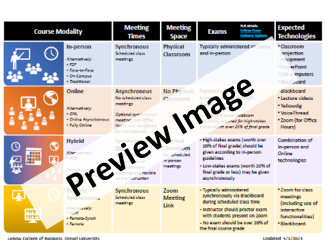In addition to traditional in-person classes, the LeBow College of Business offers courses in a range of formats that incorporate online learning. While some of Drexel’s systems label these formats as instructional methods, LeBow’s Instructional Technology department refers to them more specifically as course modalities or course delivery methods.
This article provides details on the four course modalities offered at LeBow: in-person, online, hybrid, and remote synchronous. Each modality description includes the types of learning (synchronous vs. asynchronous), technologies, and exam formats that are typically utilized. While there may occasionally be unique considerations, these guidelines should apply for the majority of LeBow courses.
Defining Synchronous and Asynchronous Learning
The terms synchronous and asynchronous are often used when referring to types of learning, class meetings, and even entire courses.
- Synchronous indicates that the instructor and students are expected to attend live class meetings held at a pre-scheduled time. These meetings can be either in-person or remote using webinar technology such as Zoom.
- Asynchronous denotes that the instructor and students are not required to attend live class meetings held at a pre-scheduled time. Instructors use course technologies to facilitate learning experiences, giving students the flexibility to participate on their own schedule while staying current with the course content from week to week.

Course Modality Table
A full-color table containing the essential details of LeBow’s course delivery modalities can be accessed using the following link:
LeBow Course Modalities.pdf
Course Modality Descriptions
In-Person (Also called: F2F, Face-to-Face, On-Campus, Traditional)
- In-person courses (also known as Face-to-Face) are synchronous. All or most class meetings are held in a physical classroom.
- Expected technologies include classroom projection equipment, PowerPoint, and lab computers (optional). Blackboard may also be used during or between classes.
- Exams are typically paper-based. Instructors can contact LeBow Tech for assistance with Remark software (similar to Scantron test scoring). For more information, see LeBow Exam Delivery Options.
Online (Also called: ONL, Online Asynchronous, Fully Online)
- Online courses are asynchronous. Instructors design a course structure, then use different instructional technologies to facilitate students’ learning experiences. Students are given the flexibility to participate on their own schedule while staying current with the course content from week to week.
- Optional synchronous meetings and office hours may be offered, but students should not be required to attend. They can, however, be required to asynchronously view the meeting recording at a later time.
- Expected technologies include Blackboard, lecture videos (including instructor audio and video), Yellowdig or Blackboard course discussions, VoiceThread, and Zoom (for office hours).
- Exams are typically administered through Blackboard. Proctoring with Respondus Lockdown Browser and Webcam Monitor is required for any single exam worth over 20% of the final course grade, but may also be used voluntarily if under that threshold. For more information, see LeBow Exam Delivery Options.
Hybrid (Also called: HYB)
- Hybrid courses make use of multiple modalities. Most commonly, half of the class meetings are held synchronously in a physical classroom, while the other half of the class is designed to be online asynchronous.
- Course scheduling will vary depending on the instructor, department, and course. Instructors should determine their plans in consultation with their department heads.
- Any synchronous meetings should be communicated to students ahead of time in the term master schedule and in the course syllabus.
- Expected technologies include Blackboard and a combination of classroom and online technologies listed above.
- Exams should follow the guidelines for in-person classes since all exams should be given in-person during the class period or during a scheduled final exam time slot. For more information, see LeBow Exam Delivery Options.
Remote Synchronous (Also called: REM, Remote, Remote-Synch)
- Remote Synchronous course meetings take place at a scheduled time, but students attend class virtually via Zoom (or another approved webinar technology)
- Expected technologies include Blackboard and Zoom (including functionalities such as screen share, voice and webcam interaction, chat, polls, and breakout rooms)
- Exams are typically administered through Blackboard during the scheduled class time. They should be proctored synchronously by the instructor with students present on Zoom. No single exam should be worth over 20% of the final course grade. For more information, see LeBow Exam Delivery Options.
If you have any questions, or would like assistance building a strong course in any of these modalities, please contact the Instructional Technology department at 215-895-2314 or lebowintech@drexel.edu.